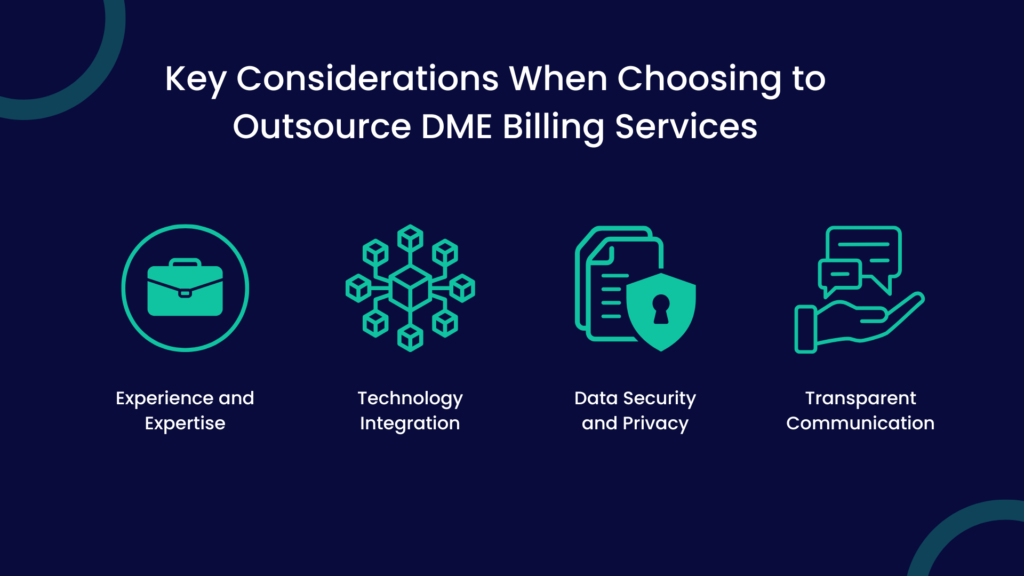TL;DR: Why Outsourcing DME Billing Works
- Improves accuracy in DME billing and coding
- Speeds up insurance reimbursements and reduces AR delays
- Ensures compliance with Medicare, Medicaid, and commercial payers
- Lowers denial rates by preventing documentation and coding errors
- Reduces administrative workload for providers and staff
- Cuts operational costs related to hiring, training, and software
- Enables better focus on patient care and clinical priorities
- Scales with business growth without added infrastructure
Managing Durable Medical Equipment (DME) billing can feel like navigating a maze full of intricate codes, regulations, and paperwork.
DME billing is a critical but time-consuming task for healthcare providers that demands precision and expertise. Outsourcing DME billing services can be a game-changer.
DME billing includes submitting claims for medically necessary equipment like wheelchairs, nebulizers, and CPAP machines. It requires accurate HCPCS coding, payer-specific documentation, and insurance eligibility checks. Any mistake can delay reimbursement or trigger denials.
Partnering with skilled billing experts can streamline operations, boost reimbursements, and allow you to focus more on what truly matters: patient care.
This guide will explain everything you need to know about outsourcing DME billing, its benefits, and how it can transform your billing processes.
Don’t let complex DME billing slow down your practice. See how expert support can improve compliance and revenue flow. Explore Our DME Billing Services »
Importance of Efficient DME Billing Processes
Efficient DME billing processes are the backbone of a thriving healthcare practice. Accurate billing ensures that claims are processed smoothly, reimbursements are timely, and the financial health of your practice remains intact.
Due to the complex nature of DME billing – from understanding insurance policies to adhering to ever-evolving compliance standards – efficiency is critical to avoid denials, delays, or revenue loss.
The latest data confirms that DME claim denials due to documentation and eligibility errors remain high in 2025, with nearly 25% of DME claims denied for these reasons. Automation, proactive denial management, and standardized workflows are key strategies to reduce preventable denials and revenue loss.
Pro Tip: Use automated insurance verification tools to reduce manual errors and speed up eligibility checks before claim submission.
An optimized billing system saves time and minimizes costly errors, improving cash flow and operational productivity.
It also directly impacts patient satisfaction, as fewer billing issues lead to a more seamless patient experience.
In an industry where every dollar and minute matter, efficient DME billing is not optional – it’s a financial necessity.
Also Read: Strategies for DME Billing
What is DME Billing Outsourcing?
Outsourcing DME billing refers to partnering with specialized third-party companies that manage the entire billing process for durable medical equipment (DME).
Key Services Included in DME Billing Outsourcing:
- Claim submission and follow-up
- Insurance eligibility verification
- Compliance checks based on payer guidelines
- Payment posting and reconciliation
- Denial management and appeal processing
Technology and Integration Capabilities:
- Advanced billing software that integrates with EHR and practice management systems
- Real-time claim tracking and AR dashboards
- Custom reporting and analytics
- HIPAA-compliant data security measures
Strategic Benefits for Providers and Suppliers:
- Delegates complex administrative tasks to experienced billing professionals
- Access to certified coders, billing experts, and compliance specialists
- Improves claim accuracy and reduces error rates
- Shortens reimbursement cycles and reduces AR days
- Allows providers to focus more on patient care and clinical operations
Outsourcing DME billing helps healthcare organizations manage regulatory complexity, meet payer-specific standards, and achieve better financial performance.
Discover how outsourcing your DME billing can streamline operations and maximize claim approvals. Connect With a Billing Specialist »
What Are the Common Challenges in DME Billing and Why Do They Matter?
Durable Medical Equipment (DME) billing is a highly specialized process that demands attention to detail, accurate coding, and constant awareness of regulatory changes. Even small oversights can lead to delays, denied claims, and financial strain.
Here are the most critical challenges DME providers face today:

1. Regulatory Compliance Is a Moving Target
Healthcare billing regulations evolve rapidly. Providers must stay current with Medicare, Medicaid, and commercial payer requirements, including modifiers, coverage updates, and documentation mandates. Failure to comply can result in claim denials, audits, and penalties.
According to the latest industry research, registration and eligibility errors account for 26.6% of all medical claim denials, while missing or invalid claim data make up another 17.2%. The majority of denials are linked to preventable front-end compliance issues, such as outdated billing practices or incomplete documentation.
Without a dedicated compliance strategy, practices risk recurring losses and mounting administrative workload.
2. Prior Authorization Requirements Are Time-Consuming and Tedious
Before delivering DME equipment, providers often must obtain authorization from payers. This involves verifying benefits, submitting clinical documentation, and following up on pending approvals.
Missing a single step in the authorization chain can delay equipment delivery, disrupt care, and interrupt revenue flow.
3. Denials Require Constant Monitoring and Manual Intervention
Claim denials are common in DME billing and can occur for various reasons:
- Incorrect or outdated HCPCS/ICD-10 codes
- Incomplete documentation
- Submitting claims outside the payer’s timely filing window
Without a structured denial management process, these issues can snowball into cash flow disruptions and compliance gaps.
Pro Tip: Set up denial reason codes in your billing system to automatically flag recurring issues and improve rework efficiency.
4. Coding Errors and Documentation Gaps Are Expensive
Precise coding is essential in DME billing, particularly when using Level II HCPCS codes and diagnosis pairings. Coders must also ensure medical necessity is documented clearly to support the claim.
A simple typo or omission in documentation can result in:
- Immediate claim rejection
- Appeals and delays
- Staff time spent on corrections and resubmission
Detailed templates and dual-layer reviews can help improve accuracy and reduce rework rates.
5. Staffing Limitations Undermine Long-Term Billing Performance
Many practices operate with lean billing departments. High turnover, lack of DME-specific training, and reliance on outdated systems can strain productivity.
Billing staff are often pulled between claims entry, appeals, and payer follow-ups – leading to errors and burnout. Without consistent training and capacity planning, practices risk long-term revenue loss.
All of these pain points lead to slower payments, lower margins, and reduced operational efficiency. For healthcare providers focused on delivering quality patient care, these administrative burdens can become unsustainable.
That’s why many turn to expert partners who specialize in RCM billing services and DME claim optimization.
Overcoming these challenges starts with the right partner. Learn How Our Billing Experts Can Help »
Which Healthcare Organizations Benefit Most from DME Billing Outsourcing?
Outsourcing DME billing offers healthcare providers a range of advantages that go beyond just simplifying the billing process.
Here’s how it can transform your operations and boost your bottom line:

1. Enhanced Accuracy and Efficiency
Third-party billing providers specialize in DME billing, ensuring high accuracy in coding, claim submissions, and documentation.
With experienced professionals handling the process, errors are minimized, denials are reduced, and claims are processed faster, resulting in a more efficient revenue cycle.
According to MGMA, practices with outsourced billing services see 12–15% faster average reimbursement turnaround time compared to in-house teams
2. Cost Savings and Financial Benefits
Outsourcing eliminates the need to invest in hiring, training, and maintaining an in-house billing team. Additionally, it reduces costs associated with errors, rework, and delayed reimbursements.
The financial benefits of outsourcing often outweigh the expenses, making it a cost-effective solution for healthcare providers.
Pro Tip: Track the cost per claim processed before and after outsourcing. Most providers see up to 20% cost savings within the first year of transitioning to an external billing partner.
3. Improved Compliance with Regulations
Keeping up with ever-changing regulations can be overwhelming. Outsourcing to professionals ensures that your billing processes comply with Medicare, Medicaid, and private-payer requirements. This reduces the risk of penalties, audits, and claim denials, giving you peace of mind.
4. Focus on Core Activities
Managing billing in-house can divert time and resources from your primary goal: delivering exceptional patient care.
By outsourcing DME billing, your team can focus on core activities such as patient engagement, clinical excellence, and practice growth while experts handle the administrative burden.
5. Access to Advanced Technology and Analytics
DME billing outsourcing companies often use cutting-edge billing software and data analytics tools. These technologies provide insights into your revenue cycle, identify trends, and optimize processes, helping you make informed decisions and achieve better financial outcomes.
Outsourcing DME billing isn’t just a convenience; it’s a strategic move that enhances productivity, reduces costs, and ensures long-term success for healthcare providers.
Who Can Benefit from DME Billing Outsourcing?
Outsourcing DME billing isn’t just for one specific type of organization – it offers tailored benefits for various entities within the healthcare ecosystem.
Here’s a closer look at who can gain the most from this strategic solution:
1. Healthcare Providers
From small practices to extensive healthcare facilities, providers offering durable medical equipment can benefit immensely from outsourcing. It frees up time and resources, allowing them to focus on patient care and operational growth.
Whether it’s hospitals, clinics, or independent physicians, outsourcing ensures streamlined billing, faster reimbursements, and reduced administrative burdens.
Pro Tip: Independent practices and specialty clinics often see the greatest ROI from outsourcing DME billing due to limited internal resources and high denial rates tied to complex coding.
2. Biopharmaceutical Companies
Biopharmaceutical companies that supply durable medical equipment (DME) also benefit from outsourcing.
Outsourcing helps them navigate the intricate billing and compliance requirements of providing DME to healthcare providers and patients.
A 2022 Deloitte report found that over 60% of mid-sized healthcare suppliers outsource at least part of their billing process to improve scalability and reduce regulatory risk.
What Should You Look for in a DME Billing Outsourcing Partner?
Outsourcing DME billing can transform your operations, but selecting the right partner is crucial to success.
Here are the key factors to keep in mind when choosing a DME billing service provider:

1. Experience and Expertise
Look for a provider with a proven track record in DME billing. Expertise in handling HCPCS and ICD coding, payer-specific requirements, and regulatory compliance is essential. A knowledgeable partner can ensure accurate claims, minimize denials, and optimize your revenue cycle.
According to Black Book Research, 91% of healthcare leaders cite vendor expertise in coding and compliance as the top factor in choosing a billing partner.
2. Technology Integration
The ideal billing partner should leverage advanced billing software and analytics tools that integrate seamlessly with your existing systems.
Automation, real-time tracking, and detailed reporting capabilities are critical for streamlining processes and gaining insights into your financial performance.
Pro Tip: Always ask potential billing partners for a live demo of their billing dashboard. This helps ensure their software integrates cleanly with your EHR and gives your team real-time visibility into claims.
3. Data Security and Privacy
Given the sensitive nature of patient data, data security should be a top priority. Ensure the provider complies with HIPAA regulations and implements robust measures, such as encryption and secure access controls, to safeguard your information.
4. Transparent Communication
Clear and consistent communication is vital for a successful partnership. Choose a provider that offers regular updates, transparent pricing, and responsive support. This ensures alignment with your goals and resolves any concerns promptly.
How to Outsource DME Billing the Right Way: Step-by-Step Guide
Outsourcing DME billing is a strategic decision that requires careful planning and execution. By following a structured approach, you can ensure a smooth transition and maximize the benefits of outsourcing. Here’s a detailed guide to help you get started:
1. Assess Your Organization’s Needs
Before outsourcing, examine your current billing processes closely. Identify pain points such as high denial rates, inefficiencies, or resource gaps.
Determine your goals – improving accuracy, speeding up claim processing, or reducing costs. Understanding your unique challenges and needs will help you find a provider that aligns with your objectives.
2. Research and Shortlist Providers
Begin by researching potential DME billing service providers. Look for companies with experience in DME billing, strong industry reputations, and positive client testimonials.
To narrow your options, use criteria such as expertise, technology capabilities, and specialization in your service area. Creating a shortlist of potential partners will make the selection process more manageable.
Pro Tip: During your shortlisting process, use a checklist to compare providers on compliance track record, technology compatibility, turnaround times, and contract transparency.
3. Evaluate Provider Capabilities and Track Records
Once you’ve shortlisted providers, investigate their capabilities further. Evaluate their experience with coding, claim submissions, denial management, and compliance. Ask for case studies or references to gauge their track record of success.
Additionally, ensure they are equipped with advanced billing software, secure systems, and analytics tools to support your operational needs.
4. Define Clear Expectations and Goals
To ensure a productive partnership, establish clear expectations from the outset. Outline specific goals, such as reducing claim denials by a certain percentage or achieving faster reimbursement timelines.
Define service-level agreements (SLAs), communication protocols, and data security measures. Transparency and alignment on expectations will set the foundation for a successful outsourcing relationship.
Common Pitfalls to Avoid in DME Billing Outsourcing
Outsourcing DME billing can be a game-changer, but it can lead to unintended challenges without careful planning. Here are some common mistakes to avoid when outsourcing DME billing services:
1. Lack of Due Diligence in Provider Selection
Rushing to select a provider without thoroughly vetting their credentials is a standard error. Choosing a partner with insufficient expertise or limited experience in DME billing can result in inefficiencies, compliance risks, and poor financial outcomes.
Conduct comprehensive research, request references, and assess the provider’s capabilities before signing on.
Also Read: Standard Written Order in DME Billing
2. Overlooking Contractual Details
The devil is in the details, and this is especially true for outsourcing contracts. Failure to review the terms carefully can lead to misunderstandings about pricing, service-level agreements (SLAs), or data security protocols.
Ensure the contract explicitly covers key elements like turnaround times, reporting standards, and measures to protect sensitive patient data.
3. Neglecting Ongoing Communication
Outsourcing is not a “set it and forget it” process. A lack of regular communication with your provider can lead to misaligned expectations, unresolved issues, or missed opportunities for optimization.
To maintain a strong partnership, establish clear communication channels, schedule regular performance reviews, and stay involved.
Avoiding these pitfalls will help you unlock the full potential of outsourcing DME billing, ensuring a smooth process and better financial outcomes for your organization.
The Future of DME Billing Outsourcing
As the healthcare industry continues to evolve, so does the landscape of DME billing outsourcing. The future promises exciting advancements and new opportunities for healthcare providers looking to optimize their billing operations.
Let’s explore the trends, technological advancements, and regulatory changes that will shape the future of DME billing outsourcing.
1. Trends in DME Billing Services
The demand for outsourcing DME billing services is expected to grow, driven by the increasing complexity of billing processes and the need for streamlined operations.
Providers will increasingly look for partners who can offer billing services and comprehensive revenue cycle management.
Integrating analytics, real-time tracking, and reporting tools will become more commonplace, allowing providers to gain deeper insights into their financial performance.
Additionally, healthcare organizations will shift toward more flexible, scalable billing solutions as they seek to adapt to changing patient demands and payer requirements.
2. Role of Artificial Intelligence and Automation
Artificial intelligence (AI) and automation are already making waves in the healthcare sector, and their influence on DME billing is expected to expand in the coming years.
AI can be leveraged to streamline administrative tasks such as claim processing, coding, and even identifying billing errors before they occur.
Automation tools will reduce the need for manual intervention, improving speed and accuracy in claim submissions and payment posting.
This will speed up revenue cycles and minimize the risk of human error, leading to higher reimbursement rates and fewer denials.
3. Impact of Evolving Regulations
DME billing outsourcing will become essential for maintaining compliance as regulatory requirements evolve.
Introducing new policies, such as changes to Medicare and Medicaid rules, will require billing teams to stay up-to-date with complex documentation, coding, and billing guidelines.
Outsourcing providers will be crucial in helping organizations navigate these regulatory changes, ensuring they remain compliant and avoid costly penalties.
In the future, outsourcing partners must be more agile, adapting quickly to regulatory shifts and providing proactive solutions to stay ahead of the curve.
The future of DME billing outsourcing looks promising, with advanced technology, regulatory compliance, and operational efficiency taking center stage.
As healthcare providers seek ways to reduce costs and improve accuracy, outsourcing will continue to be a vital tool for navigating the challenges of DME billing.
ROI Analysis for Biopharmaceutical Companies
Outsourcing DME billing can be a game-changer for biopharmaceutical companies, offering significant improvements in operational efficiency, cost-effectiveness, and compliance.
However, before committing to outsourcing, these companies must conduct a thorough Return on Investment (ROI) analysis to evaluate the long-term value.
Here’s how biopharmaceutical companies can assess the potential ROI from outsourcing DME billing services.
1. Cost Reduction
One of the most immediate and noticeable benefits of outsourcing DME billing is cost savings. By partnering with a specialized billing service provider, biopharmaceutical companies can reduce or eliminate the costs of maintaining an in-house billing team.
These savings include payroll, training, overhead expenses, and purchasing and maintaining billing software. The result is a more streamlined, cost-efficient operation that doesn’t sacrifice quality.
2. Increased Revenue through Faster Reimbursement
Outsourcing providers typically have the expertise and technology to submit claims quickly and accurately, leading to faster reimbursements.
As a result, biopharmaceutical companies can experience shorter revenue cycles, improving cash flow and reducing the time spent waiting for payments.
The more rapid processing of claims also reduces the risk of missed or delayed payments, boosting overall revenue.
3. Minimized Errors and Denials
Outsourcing DME billing to experienced professionals reduces the risk of errors, improper coding, and non-compliance.
Biopharmaceutical companies can minimize denied claims and save time on corrections by proactively addressing these issues.
The fewer errors made, the higher the reimbursement rate directly impacts revenue generation. Moreover, minimizing denials reduces the need for costly appeals, enhancing the ROI from outsourcing.
4. Improved Compliance and Reduced Risk
DME billing is subject to stringent regulatory requirements, including those from Medicare, Medicaid, and private insurers.
Outsourcing partners are well-versed in these regulations and keep up to date with any changes.
This ensures that biopharmaceutical companies remain compliant, avoiding penalties and audit risks.
Outsourcing safeguards a company’s reputation and financial stability by mitigating the risk of non-compliance, thereby enhancing the long-term value of the partnership.
5. Focus on Core Business Activities
Outsourcing DME billing allows biopharmaceutical companies to focus more on their core business activities, such as drug development, marketing, and distribution, rather than spending resources managing complex billing tasks.
This reallocation of focus can lead to growth opportunities and increased innovation, ultimately enhancing overall business performance and profitability.
6. Scalability and Flexibility
As biopharmaceutical companies expand, they often face the challenge of scaling their billing operations accordingly. Outsourcing allows scaling up or down without hiring additional in-house staff.
This adaptability ensures that billing operations can meet demand without a significant cost increase, supporting growth without straining resources.
Summing Up
Outsourcing DME billing offers substantial benefits for healthcare providers and biopharmaceutical companies alike.
From enhanced accuracy and compliance to cost savings and improved cash flow, the advantages of partnering with an experienced billing service provider are clear.
Outsourcing allows organizations to concentrate on their core business activities by cutting administrative burdens, reducing errors, and streamlining revenue cycles, leading to long-term success.
Outsourcing could be your business’s solution to streamline your DME billing process, improve efficiency, and ensure regulatory compliance.
Partnering with the right service provider can transform your revenue cycle management and help you stay ahead in a competitive healthcare landscape.
Ready to optimize your DME billing process and take your operations to the next level? Contact Promantra, a trusted leader in healthcare outsourcing solutions, to learn how our specialized DME billing services can help you improve accuracy, compliance, and profitability.
Ready to simplify your DME billing and boost collections? Schedule a Free Consultation with Our Billing Experts »




